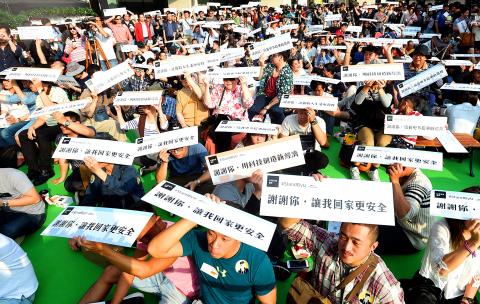US ride-hailing company Uber Technologies Inc yesterday said it does not plan to exit the Taiwanese market yet, despite looming fines.
Uber’s comments came as the San Francisco-based company is facing up to NT$25 million (US$775,194) in fines after the legislature passed an amendment to the Highway Act (公路法) earlier this month, significantly increasing fines on illegal taxi service operators by about 166 times.
Uber’s local unit could be forced to shut down after President Tsai Ing-wen (蔡英文) signs the amendment into law.

Photo: Lin Cheng-kung, Taipei Times
“The company considers Taiwan an important market,” Uber Taiwan general manager Gu Li-kai (顧立楷) said. “We hope to stay and to grow our business here. We hold a relatively optimistic view about this.”
Gu made the remarks on the sidelines of a news conference for the launch of a campaign in Taipei, “StandByU-Uber stays,” calling on consumers and drivers to support the ride-sharing service.
“We will continue to communicate with government agencies to look for any possibility of relaxing the rules… We hope to reach a consensus with the government as soon as possible,” Gu said.
The campaign is the latest effort by Uber to curry favor with the public as the company’s talks with the government have stalled.
“Uber is concerned about the heavy penalties and about their impact on freelance drivers,” Gu said.
It is unsuitable to apply existing public transportation rules, which have been in place for three or four decades, to regulate the six-year-old car-sharing industry, Gu said.
Uber offers an app-based ride-sharing service, which is very different from companies in the traditional transportation industry, he said.
The company is exploring better solutions in Taiwan and in other countries to adjust outdated rules and to make it possible for the ride-sharing industry, or the whole sharing-economy to develop, he said.
India unveiled a more liberal taxi policy to allow Uber and its Indian rival, Ola, to offer app-based ride-sharing services in the country, Gu said.
The Uber Taiwan app has been downloaded about 1 million times and the firm has recruited about 10,000 drivers since it entered the market in 2013.
Gu said the company is willing to pay e-commerce operator taxes, that mean Google Play, Uber and Apple Store pay 5 percent business tax.
Uber in talks with more than 10 insurers, including Fubon Insurance Co (富邦產險), to offer insurance solutions for its drivers, Gu said.
However, insurers are conservative about collaborating with Uber due to the government’s ambiguous stance over its ride-sharing service, Gu said.

Intel Corp chief executive officer Lip-Bu Tan (陳立武) is expected to meet with Taiwanese suppliers next month in conjunction with the opening of the Computex Taipei trade show, supply chain sources said on Monday. The visit, the first for Tan to Taiwan since assuming his new post last month, would be aimed at enhancing Intel’s ties with suppliers in Taiwan as he attempts to help turn around the struggling US chipmaker, the sources said. Tan is to hold a banquet to celebrate Intel’s 40-year presence in Taiwan before Computex opens on May 20 and invite dozens of Taiwanese suppliers to exchange views

Application-specific integrated circuit designer Faraday Technology Corp (智原) yesterday said that although revenue this quarter would decline 30 percent from last quarter, it retained its full-year forecast of revenue growth of 100 percent. The company attributed the quarterly drop to a slowdown in customers’ production of chips using Faraday’s advanced packaging technology. The company is still confident about its revenue growth this year, given its strong “design-win” — or the projects it won to help customers design their chips, Faraday president Steve Wang (王國雍) told an online earnings conference. “The design-win this year is better than we expected. We believe we will win

Chizuko Kimura has become the first female sushi chef in the world to win a Michelin star, fulfilling a promise she made to her dying husband to continue his legacy. The 54-year-old Japanese chef regained the Michelin star her late husband, Shunei Kimura, won three years ago for their Sushi Shunei restaurant in Paris. For Shunei Kimura, the star was a dream come true. However, the joy was short-lived. He died from cancer just three months later in June 2022. He was 65. The following year, the restaurant in the heart of Montmartre lost its star rating. Chizuko Kimura insisted that the new star is still down

While China’s leaders use their economic and political might to fight US President Donald Trump’s trade war “to the end,” its army of social media soldiers are embarking on a more humorous campaign online. Trump’s tariff blitz has seen Washington and Beijing impose eye-watering duties on imports from the other, fanning a standoff between the economic superpowers that has sparked global recession fears and sent markets into a tailspin. Trump says his policy is a response to years of being “ripped off” by other countries and aims to bring manufacturing to the US, forcing companies to employ US workers. However, China’s online warriors